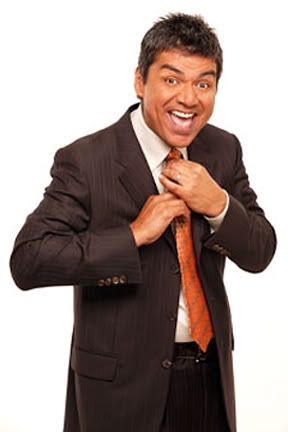
IN THE AIR TONIGHT
LATINO LEGEND GEORGE LOPEZ ON THE LATE NIGHT FRAY
By Bret Love
You don’t have a career like George Lopez’s without being a fighter.
Born in 1961, the Mexican-American was abandoned by both parents by the age of 10 and raised by his maternal grandmother. Though he began his comedy career in the ‘80s, it wasn’t until Sandra Bullock gave him his own sitcom in 2002 that he achieved mainstream fame. Cursed with a genetic condition that caused his kidneys to deteriorate, Lopez not only received a successful kidney transplant courtesy of wife Ann in 2005, he also brought social awareness to the issue with a storyline on his hit show.
So you’d be a fool to bet against the guy as he enters the late night fray with his TBS talk show, Lopez Tonight, which debuted in November with a promise to re-energize the lagging format by “bringing the party back to late night.”
Lopez admits his journey to the top of the comedy heap has been an arduous one, but insists that the difficulties he faced along the way ultimately made him better. “The only way to improve as a comedian is to suffer and learn on the job. Every comedian’s biggest fear is walking into a nearly empty room, and you’re like, ‘I’m gonna eat it…’ But you have to eat it! You’ve gotta have that ‘I’m gonna knock ‘em out’ mentality. But there are a lot of hard knocks along the way.”
What did you learn from your years on the road that prepared you for all the projects you’re doing now?
Life on the road really teaches you to be self-sufficient. A lot of guys get sidetracked on the road– they drink too much or do drugs– but I used that time to make myself better. I knew I was better than just being a road comic, even though I was still doing it after being on Arsenio 16 times. But nothing was happening for me career-wise, and it was frustrating because I had to work harder to prove that I could be better.
You didn’t land your first TV show until 2002, when you were 41. What were the benefits of becoming famous later in life?
It gave me the perspective of age. I probably would’ve destroyed myself if it had happened when I was in my twenties. It just made me go through some of the hard knocks of life so I could appreciate everything instead of just blowing up and becoming an overnight success. It gave me an appreciation for the value of working hard. The first car I bought, or the first house, or the first time I got a nice watch– all those material things– I didn’t take them for granted. But the greatest benefit was the way it impacted my desire to become a better performer. Now, I appreciate what I have even more because I worked hard for it.
Time Magazine named you one of the 25 Most Influential Hispanics in the world. Do you see yourself as a sort of ambassador for Latino culture?
In the beginning, like 20 years ago when I was still basically a kid, we looked different from middle America because we weren’t as heavily populated as we are now. TV was very different back then, but now telenovelas and all those other Spanish language programs are huge! They get higher ratings than all the nightly news programs combined, and they’ve become an entity unto their own. As an English-speaking Latino who also speaks Spanish, I see an opportunity for my show to be inclusive rather than divisive. I want to bring the black, white, Latino, Asian, Middle Eastern and mixed race audiences together, and I want my show to look like what their lives look like every day.
Is that something you see missing from the late night talk show format?
Definitely. The format is a little down in the ratings, and the problem is all the shows are fighting over the same basic percentage of the pie. Some of their audience may come over to check out my show, but they don’t have to, if you check out the demographics TBS already attracts. They’re 20 years younger than the Tonight Show’s audience, with a huge number of African-Americans and Latinos, even before I get there. With the success of my sitcom I’ve managed to pull a lot of different demos together, but I still have that sort of underdog quality that Latinos love to support.
What does it mean to you to be this icon of your culture that young Latinos look up to?
It means everything to me! I watched guys like Desi Arnaz and Freddie Prinze, Jr. when I was growing up, and I hoped and dreamed that one day I could have a career like this. Very few people in this life get to live to see their dreams come true, and I’m proud to say that I’ve managed to do that.



No comments:
Post a Comment